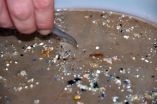(Press-News.org) Microplastics – microscopic particles of plastic debris – are of increasing concern because of their widespread presence in the oceans and the potential physical and toxicological risks they pose to organisms.
This is the view of two of the world's most eminent authorities on the subject, Professor Kara Lavender Law, of Sea Education Association (Woods Hole, MA), and Professor Richard Thompson of Plymouth University (UK).
In an article published today in the journal Science, the two scientists have called for urgent action to "turn off the tap" and divert plastic waste away from the marine environment.
Microplastics have now been documented in all five of the ocean's subtropical gyres – and have even been detected in Arctic sea ice – with some of the highest accumulations occurring thousands of miles from land. These plastic bits have been found in organisms ranging in size from small invertebrates to large mammals, and are known to concentrate toxic chemicals already present in seawater. This raises concern about the potential consequences to marine organisms.
"Our scientific understanding of this environmental problem is accelerating rapidly, with many new research efforts that go well beyond simply documenting the presence of plastic in the ocean," said Professor Law, who led a 2008 paper in Science describing widespread plastic contamination in the North Atlantic Ocean from more than 25 years of data collected by Sea Education Association faculty and undergraduate students during SEA Semester study abroad voyages.
Most studies of ocean microplastic focus on the debris that floats at the sea surface, but this leaves other potential collections of plastic unaccounted for.
"Major unanswered questions remain about the amounts of microplastic debris that might be accumulating on the seafloor," said Professor Thompson, whose 2004 paper in Science first coined the term 'microplastics'. "We also know very little about where, geographically, are the largest inputs of plastic to the marine environment."
Despite open questions such as these, the authors say that microplastics are already something to worry about, and that efforts are needed to divert the source of this debris away from the ocean, or to "turn off the tap". This was the message that Professor Thompson delivered to Senator John Kerry last month at the US State Department's Our Oceans Conference: Marine Pollution.
Both say that plastic waste should be viewed as a valuable resource to be captured and re-used, which would simultaneously reduce the amount entering the environment.
Policy initiatives have been gaining momentum at municipal, state, and national levels in the U.S. In June this year Illinois passed legislation banning microbeads (microplastics used in cosmetic products that enter the environment through wastewater), with similar legislation pending in New York and California, and recently introduced in the U.S. House of Representatives. In April this year the European Parliament voted to reduce the consumption of single use plastic carrier bags and phase out bags that fragment rather than degrade.
"We have been conducting an unintended experiment with the addition of large amounts of this man-made material into the environment," said Law. "But this is a solvable problem. By each of us making small changes in our daily habits – by carrying reusable water bottles and coffee mugs, for example – we can collectively reduce our dependence on 'disposable' items that might ultimately be lost to the environment."
INFORMATION:
Contacts:
Kara Lavender Law, Sea Education Association
(508) 444-1935, klavender@sea.edu
Richard C. Thompson, Plymouth University
R.C.Thompson@plymouth.ac.uk
Special Notes to Reporters
More information, including a copy of the paper, can be found online at the Science press package at http://www.eurekalert.org/jrnls/sci. You will need your user ID and password to access this information.
About Sea Education Association/SEA Semester®
Sea Education Association (SEA) is an internationally recognized leader in undergraduate ocean education. For nearly 45 years and over one million nautical miles sailed, SEA has educated students about the world's oceans through its fully accredited study abroad program, SEA Semester.
Sea Education Association/SEA Semester faculty are active in their fields and contribute regularly to professional conferences and scholarly journals. Research conducted aboard SEA vessels has been featured in numerous publications in oceanography, environmental science, biology, geology, chemistry, and physics, among others.
SEA/SEA Semester is based on Cape Cod in the oceanographic research community of Woods Hole, Massachusetts and has two research vessels: the SSV Corwith Cramer, operating in the Atlantic Ocean, and the SSV Robert C. Seamans, operating in the Pacific.
Rigorous academics combined with the adventure of sailing aboard a tall ship create a truly one-of-a-kind study abroad program. All SEA Semester programs are accredited by Boston University and offer up to 18 semester credits. While the program is renowned for its excellence in the sciences, all SEA Semester programs are interdisciplinary and welcome students from any major. Students also gain valuable experience in leadership training, group dynamics, and team-building: all areas that help students develop into well-rounded, confident, open-minded and contributing members of society. For more information on Sea Education Association/SEA Semester® please visit: http://www.sea.edu
About Plymouth University
Consistently ranked as one of the leading universities in the UK, and awarded a Queen's Anniversary Prize for Higher and Further Education in 2012, Plymouth has a strong record of excellence, enterprise and innovation across its teaching and research activities. Distinguished by its long-term engagement with business and the community, the University enjoys outstanding links with employers and plays a key role in civic and regional leadership. It is the only university in the world to have been awarded the Social Enterprise Mark in recognition of its work in support of the sector.
With around 30,000 students, including those studying higher education at its partner colleges throughout the South West, the University is one of largest in the UK. It enjoys a high rate of graduate employment and has recently invested more than £150 million in its estate and facilities to enhance the student experience and support world-class research.
Plymouth has embedded sustainability across its operations, and is the overall best performing university in the People & Planet Green League. It is the first modern university to found a medical and dental school – the Plymouth University Peninsula Schools of Medicine and Dentistry – and is the leading provider of Higher Education in Cornwall. For more information, please visit http://www.plymouth.ac.uk.
Leading scientists express rising concern about 'microplastics' in the ocean
2014-07-10
ELSE PRESS RELEASES FROM THIS DATE:
Control strategy for Dengue, malaria increases risk of West Nile virus
2014-07-10
Mosquitoes infected with the bacteria Wolbachia are more likely to become infected with West Nile virus and more likely to transmit the virus to humans, according to a team of researchers.
"Previous research has shown that Wolbachia -- a genus of bacteria that live inside mosquitoes -- render mosquitoes resistant to pathogen infection, thereby preventing the mosquitoes from infecting humans with the pathogens," said Jason Rasgon, associate professor of entomology, Penn State. "As a result, researchers are currently releasing Wolbachia-infected mosquitoes into the wild ...
New study shows drinking alcohol provides no heart health benefit
2014-07-10
PHILADELPHIA – Reducing the amount of alcoholic beverages consumed, even for light-to-moderate drinkers, may improve cardiovascular health, including a reduced risk of coronary heart disease, lower body mass index (BMI) and blood pressure, according to a new multi-center study published in The BMJ and co-led by the Perelman School of Medicine at the University of Pennsylvania. The latest findings call into question previous studies which suggest that consuming light-to-moderate amounts of alcohol (0.6-0.8 fluid ounces/day) may have a protective effect on cardiovascular ...
Study looks at how Twitter can be used to address specific health issues
2014-07-10
Childhood obesity is one of the top public health concerns in the United States, with 32 percent of youths aged 2-19 classified as obese as of 2012. As health problems such as childhood obesity grow, individuals and organizations have taken to Twitter to discuss the problem.
A new study, led by Jenine K. Harris, PhD, assistant professor at the Brown School at Washington University in St. Louis, examined the use of the hashtag #childhoodobesity in tweets to track Twitter conversations about the issue of overweight kids.
The study published this month in the American ...
Sophisticated radiation detector designed for broad public use
2014-07-10
CORVALLIS, Ore. – Nuclear engineers at Oregon State University have developed a small, portable and inexpensive radiation detection device that should help people all over the world better understand the radiation around them, its type and intensity, and whether or not it poses a health risk.
The device was developed in part due to public demand following the nuclear incident in Fukushima, Japan, in 2011, when many regional residents were unsure what level of radiation they were being exposed to and whether their homes, food, environment and drinking water were safe.
Devices ...
'Mississippi Baby' now has detectable HIV, researchers find
2014-07-10
The child known as the "Mississippi baby"—an infant seemingly cured of HIV that was reported as a case study of a prolonged remission of HIV infection in The New England Journal of Medicine last fall—now has detectable levels of HIV after more than two years of not taking antiretroviral therapy without evidence of virus, according to the pediatric HIV specialist and researchers involved in the case.
"Certainly, this is a disappointing turn of events for this young child, the medical staff involved in the child's care, and the HIV/AIDS research community," said NIAID ...
Your next Angry Birds opponent could be a robot
2014-07-10
With the help of a smart tablet and Angry Birds, children can now do something typically reserved for engineers and computer scientists: program a robot to learn new skills. The Georgia Institute of Technology project is designed to serve as a rehabilitation tool and to help kids with disabilities.
The researchers have paired a small humanoid robot with an Android tablet. Kids teach it how to play Angry Birds, dragging their finger on the tablet to whiz the bird across the screen. In the meantime, the robot watches what happens and records "snapshots" in its memory. ...
It's Your Game ... Keep It Real reduces dating violence among minority youth
2014-07-10
HOUSTON – (July 10, 2014) – New research from The University of Texas Health Science Center at Houston (UTHealth) shows that It's Your Game…Keep it Real (IYG), a health education program designed to delay sexual behavior and promote healthy dating relationships, can significantly reduce dating violence behaviors among minority youth.
According to the Centers for Disease Control and Prevention, 10 percent of high school youth are victims of physical dating violence and other studies suggest that more than 20 percent are victims of emotional dating violence. Previous studies ...
NOAA, partners predict significant harmful algal bloom in western Lake Erie this summer
2014-07-10
NOAA and its research partners predict that western Lake Erie will have a significant bloom of cyanobacteria, a toxic blue-green algae, during the 2014 bloom season in late summer. However, the predicted bloom is expected to be smaller than last year's intense bloom, and considerably less than the record-setting 2011 bloom.
Bloom impacts will vary across the lake's western basin and are classified by an estimate of both its concentration and how far it spreads.
Harmful algal blooms (HABs) were common in western Lake Erie between the 1960s and 1980s. After a lapse of ...
CNIO scientists develop technology to redirect proteins towards specific areas of the genome
2014-07-10
The Spanish National Cancer Research Centre (CNIO) Macromolecular Crystallography Group has managed to reprogramme the binding of a protein called BuD to DNA in order to redirect it towards specific DNA regions. Guillermo Montoya, the researcher who led the study, says the discovery: "will allow us to modify and edit the instructions contained in the genome to treat genetic diseases or to develop genetically-modified organisms." The study is published in the journal Acta Crystallographica, Section D: Biological Crystallography.
The possibility of making à la carte modifications ...
New technology reveals insights into mechanisms underlying amyloid diseases
2014-07-10
Amsterdam, NL, 10 July 2014 – Amyloid diseases, such as Alzheimer's disease, type 2 diabetes, cataracts, and the spongiform encephalopathies, all share the common trait that proteins aggregate into long fibers which then form plaques. Yet in vitro studies have found that neither the amylin monomer precursors nor the plaques themselves are very toxic. New evidence using two-dimensional infrared (2D IR) spectroscopy has revealed an intermediate structure during the amylin aggregation pathway that may explain toxicity, opening a window for possible interventions, according ...






